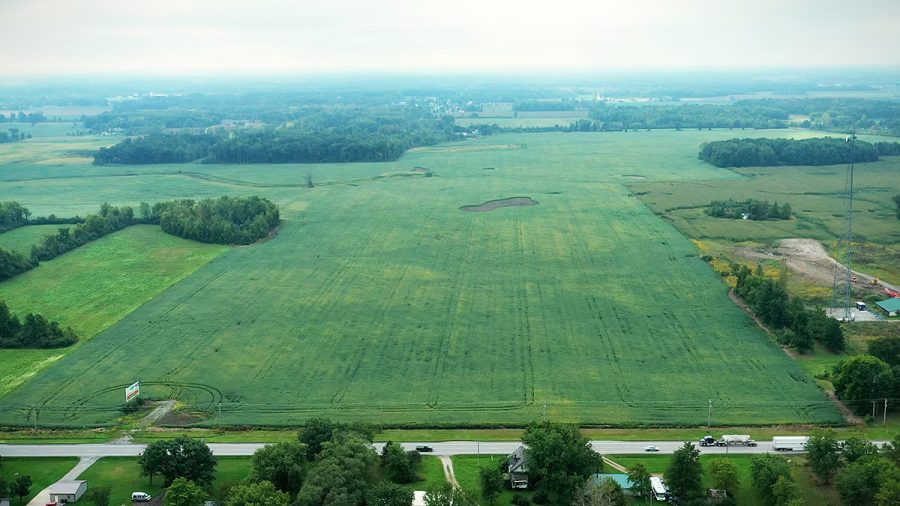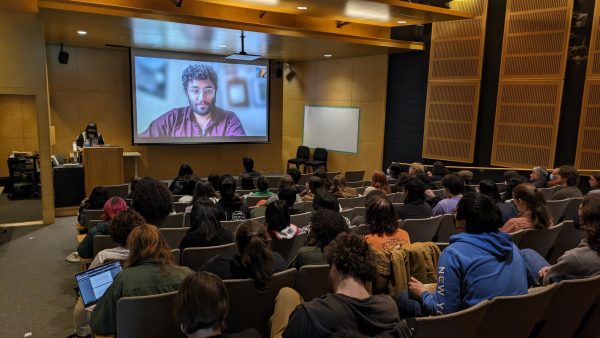Industrial Development Along Route 20 Facilitated by City
Photo courtesy of the Wendt Group
The City bought land in Dec. 2022 for a new industrial park.
In December 2022, Oberlin bought 211 acres of land from Pittsfield Township for $2.4 million for a new industrial park. According to City Council President Bryan Burgess, the current industrial park from the ’60s is full, so the City felt that it needed to buy property to open the possibility of expansion.
“Oberlin’s industrial park, our current one, was started in the early 1960s, and it was a recognition that as a college town, our primary piece of jobs and tax revenue are from Oberlin College, but it would [also] be a good idea to diversify away from that,” Burgess said. “So the Federal Aviation Administration was built, and the Oberlin Industrial Park. They built that pretty quickly. It actually took us about 50 years to fill the industrial park, but the industrial park is now full. With no other opportunity for expansion, if we want to introduce new jobs and new tax revenue to the City, we’re gonna have to build a new industrial park.”
The City decided to buy undeveloped land based on recent trends in industrial development. According to Oberlin Director of Planning and Development Carrie Porter, developers previously would build speculative buildings designed to fit a variety of uses, and companies would search for buildings that matched their desired specifications, but recently, companies have begun buying land and building to their needs.
“Before this past year, everybody wanted a building,” Porter said. “I think now it’s gotten to the point where there’s not a lot of buildings left, so now the trend is reversed and now everybody’s looking for land so they can build their own.”
Before the purchase of the new land, the City owned 32.8 additional acres of land in Oberlin zoned for “light industrial” purposes. However, sprinkled throughout the property are federally protected wetlands that prevent development.
Porter believes the new land is better suited to development.
“It’s all pretty much usable,” Porter said. “There’s a couple little ponds in it, but there’s not a lot of wetlands or anything like that on these two properties.”
The land is located just south of Walmart, near the forthcoming Oberlin Crossing Shopping Center and other developments currently in consideration. Each property connects with U.S. Route 20, which runs from Oregon to Boston, Massachusetts.
“[U.S. Route] 20 is obviously a major corridor and probably the best corridor for industrial development that we have,” Porter said.
Oberlin has an annexation agreement with Pittsfield Township, where the land is located. The City will work with the township to determine how it will distribute resources and revenue. Developing the land will take several years. Before it can advertise the land to companies that might potentially build on the property, the City will install utilities.
“It’s gonna take us a minute to figure out what utilities we need there,” Porter said. “We’re looking at building a new electric substation to serve not only that property but the south end of town. We were looking at that, and there’s long lead times on the equipment for an electric substation, so it’s gonna take us a little bit. We gotta look at water and sewer and all that, too, so we got a little bit of time to get things organized.”
In the meantime, the City has entered into a lease agreement with a local farmer who will farm the land for two growing seasons.
“We signed a two-year lease with a farmer who’s been farming that land for a generation or two,” Burgess said. “So in the short term, that will continue to be farmland. … We put it out for bid, and there were at least a half a dozen farmers that bid on that, and it just so happened that the farmer who’s been working it this whole time, he put in the highest price.”
After the City has prepared the land, it will be able to offer the land for sale to companies to build on. Currently, College third-year Kern Brunk is working on a summer fellowship to find the most suitable companies for Oberlin’s industrial park. The state of Ohio sends Oberlin the information of companies interested in purchasing land, and Oberlin can offer them land if the company’s needs align with the City’s own.
Brunk is developing a scoring system that will allow the City to compare companies against one another. Brunk will factor in what the companies want, including their electricity needs, the number of acres they’d like to buy, and whether they want the land surveyed before they buy it, as well what the City wants a company to bring to Oberlin.
“There are some industries that are persona non grata,” Brunk said. “We will not be looking at chemicals, steel manufacturing — things that could cause pollution and harm the local environment.”
Burgess says that the current industrial park can provide a model of the values that the City brings to planning for the new industrial park. “Our current industrial park does automation, robotics, healthcare, and there’s even a marijuana greenhouse — none of that is dirty industry with smokestacks,” he said. “So, what are the high tech jobs of the future that might be suitable for an Oberlin market? Something in renewable energy, maybe something in electric vehicles. Maybe something else in health care.”
Porter hopes that companies interested in Oberlin’s carbon neutrality commitment will be attracted to the new park.
“We have our own electric company here in Oberlin that’s run by the City, and it’s 100 percent renewable power,” Porter said. “There’s companies out there now that [are] looking for things like that because they want to be sustainable. They have a commitment to reducing their carbon footprint. … There’s been a few leads that come from the state that the companies were looking for those particular things, but back when those came through, we didn’t have this land, so we couldn’t offer anything.”




